|
|
|
Sort Order |
|
|
|
Items / Page
|
|
|
|
|
|
|
| Srl | Item |
| 1 |
ID:
124023
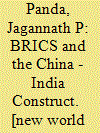

|
|
|
|
|
| Publication |
New Delhi, Institute for Defence Studies & Analyses, 2013.
|
| Description |
124p.Pbk
|
| Series |
IDSA Monograph Series No.24 September 2013
|
| Standard Number |
9789382169246
|
|
|
|
|
|
|
|
|
|
|
|
Copies: C:2/I:0,R:0,Q:0
Circulation
| Accession# | Call# | Current Location | Status | Policy | Location |
| 057458 | 327.10601/PAN 057458 | Main | On Shelf | General | |
| 057459 | 327.10601/PAN 057459 | Main | On Shelf | General | |
|
|
|
|
| 2 |
ID:
117814
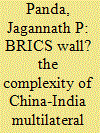

|
|
|
| 3 |
ID:
120413
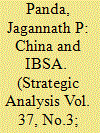

|
|
|
|
|
| Publication |
2013.
|
| Summary/Abstract |
The India-Brazil-South Africa (IBSA) forum, which was formalised in June 2003 through the adoption of the Brasilia Declaration based on the spirit of South-South solidarity, turns a decade old in 2013. The event will be celebrated at its first decadal summit in New Delhi. At the same time, this event needs to be juxtaposed with the fifth consecutive leadership summit of Brazil-Russia-India-China-South Africa (BRICS) in Durban in March 2013. Both IBSA and BRICS are in the limelight for their cross-continental politics. It has also been noted that China may have upped the ante against India by bringing South Africa into BRICS to demote IBSA as a multilateral organisation.
|
|
|
|
|
|
|
|
|
|
|
|
|
|
|
|
| 4 |
ID:
178695
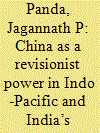

|
|
|
|
|
| Summary/Abstract |
Debate concerning China’s emergence as a revisionist power has taken a more direct shape under the Donald Trump administration in the United States. Such a debate is not as prevalent in India even though New Delhi began perceiving Beijing’s assertive rise long-ago with caution. India’s deductions of China as a revisionist power are drawn on its national security calculus and the anticipatory challenges it faces from China in the land and maritime domain that threatens the status-quo of the region. In other words, India's perception of China in Indo-Pacific is much more constructive, drawn on a dualist outlook of power-partner contention, that comes both as a challenge as well as opportunity.
|
|
|
|
|
|
|
|
|
|
|
|
|
|
|
|
| 5 |
ID:
106174
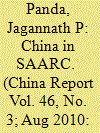

|
|
|
| 6 |
ID:
069064


|
|
|
| 7 |
ID:
080973
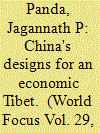

|
|
|
| 8 |
ID:
074230
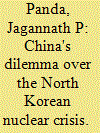

|
|
|
| 9 |
ID:
099017
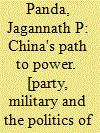

|
|
|
|
|
| Publication |
New Delhi, Pentagon security International, 2010.
|
| Description |
ix, 234p.
|
| Standard Number |
9788182744820, hbk
|
|
|
|
|
|
|
|
|
|
|
|
Copies: C:2/I:0,R:0,Q:0
Circulation
| Accession# | Call# | Current Location | Status | Policy | Location |
| 055266 | 355.00951/PAN 055266 | Main | On Shelf | General | |
| 055267 | 355.00951/PAN 055267 | Main | On Shelf | General | |
|
|
|
|
| 10 |
ID:
093871
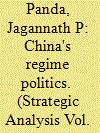

|
|
|
|
|
| Publication |
2010.
|
| Summary/Abstract |
Specialists on Chinese studies are divided on whether or not China is moving towards democracy. Many scholars forcefully argue that China by now is fairly democratic. While conforming to these views, this article prompts the thesis that China is already somewhat democratic today and is becoming more so. This is argued by highlighting the trends and the progressive character in its emerging regime politics. On the surface, these progressive trends and character may be seen as rhetorical and more as a communist proposition to legitimize its ruling. But the mere emergence of these democratic features confirms that the regime in China is in a phase of transition. In the idiom of political regimes, one may like to call it a 'hybrid' state
|
|
|
|
|
|
|
|
|
|
|
|
|
|
|
|
| 11 |
ID:
134050
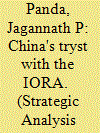

|
|
|
|
|
| Publication |
2014.
|
| Summary/Abstract |
Engaging with a multilateral body requires constructive foreign policy forethought, especially for a country that is not a fully fledged member of that body. China's overtures to the Indian Ocean Rim Association (IORA) exemplify this approach. The Indian Ocean and India are the two most immediate elements in China's policy approach to the IORA. With 20 member states, extra-territorial major powers as important dialogue partners, and the increasing importance of energy politics in the region, the IORA today is a significant multilateral body in China's calculus. Beijing's involvement with the IORA bespeaks the construct and strategy of a great power. For India, China's power construct in this matter poses three challenges: Beijing as a maritime power; Beijing as an economic power; and Beijing as a polygonal power.
|
|
|
|
|
|
|
|
|
|
|
|
|
|
|
|
| 12 |
ID:
123722


|
|
|
|
|
| Publication |
2013.
|
| Summary/Abstract |
Asymmetric growth in foreign policy dynamics and power posture between China and India at the regional level is the new contour of current Asian politics. One vital aspect of it is the multilateral power politics or engagement through which rising powers connect and integrate with regional vis-à-vis global conditions in order to contend and compete with each other's strategic interests and primacy. This Asian rendezvous is part and parcel of the rhetoric of liberalist sentiments, which realistically do not work in favor of the developing countries' relationships. The history of the China-India bilateral discourse suggests that. In today's context, the increasing multilateral engagement between the two countries is a potential medium for denying space and holding an edge over each other's priority of acquiring assorted global resources, forming an Asian and a global identity, and notably in securing respective national strategic objectives. Current foreign policy contours of both countries are quite different from the previous order and politics. The boundary will continue to be the fundamental problem in their bilateral discourse, while the Asian discourse of Sino-Indian multilateral politics will be decided by their competition and power rivalry in resources and identity
|
|
|
|
|
|
|
|
|
|
|
|
|
|
|
|
| 13 |
ID:
133612
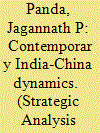

|
|
|
|
|
| Publication |
2014.
|
| Summary/Abstract |
This review essay examines the significance of India-China relations against the background of the current phenomenon of a multipolar world in the light of four recent publications on the subject. Tien-sze Fang's and Jeff M. Smith's works discuss the current facets of India-China relations, while William Antholis's and Carl J. Dahlman's works deal with the character and standing that India and China bring to their regional and global discourse. After reviewing the core of these books, this essay will seek to locate the dialogue and import of India-China relations in two constructive settings: first, the versatility of this relationship in a multipolar world order; second, why this relationship is important to the future of multipolar world politics. In the official idiom, India-China dynamics are not confined to the bilateral ambience. For example, a joint statement issued on the occasion of the visit of Premier Li Keqiang to India (May 20, 2013) records that 'There is enough space in the world for the development of India and China … As the two largest developing countries in the world, the relationship between India and China transcends bilateral scope and has acquired regional, global and strategic significance'.1 This official endorsement comes against the background that the year 2014 is the 60th anniversary of the occasion when the Panchasheel discourse was first enunciated.
|
|
|
|
|
|
|
|
|
|
|
|
|
|
|
|
| 14 |
ID:
086246
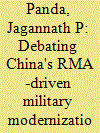

|
|
|
|
|
| Publication |
2009.
|
| Summary/Abstract |
This article intends to examine the notion of 'Revolution in Military Affairs' (RMA) in China and how the People's Liberation Army (zhongguo renmin jiefangjun) is thrusting RMA initiatives on its modernization programme. It sheds light on the issue of China's 'RMA-Driven Military Modernization' programme and situates the effect of these initiatives in the Indian context. However, the core argument of this article is that the term RMA extends beyond the classical military connotation, forming 'Chinese characteristics' - revolving around China's overall socio-political and national objectives. This article would argue that RMA serves as a central linkage between China's evolving thought process on future warfare, overcoming the deficiencies in technological weapons in comparatively primitive branches of the PLA, and as an approach to strengthening China's Comprehensive National Power status.
|
|
|
|
|
|
|
|
|
|
|
|
|
|
|
|
| 15 |
ID:
127468
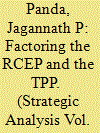

|
|
|
|
|
| Publication |
2014.
|
| Summary/Abstract |
The Regional Comprehensive Economic Partnership (RCEP) and the Trans-Pacific Partnership (TPP) are not necessarily two contending trade liberalising models, but their import and arrival have posed stiff political challenges for many countries, including China and India, Asia's two heavyweights. With these two initiatives, the regional trade of Asia is entering an interesting phase of liberalisation and integration. In fact, it is gradually becoming clear that the facets and nuances attached to these two trade liberalisation models will impact regional power politics massively in times to come. While the success of TPP hinges on the global economic authority of the US and how the negotiation process unfolds, the future dynamism of RCEP will depend heavily on how China and the Association of South-East Asian Nations (ASEAN) conduct their negotiation process and accommodate the interests of other regional powers, including India. Hitherto, it has been no secret that both RCEP and TPP will greatly affect and influence ASEAN and the role of its free trade agreement (FTA) partner countries, including China and India. In this regional stratagem, China-India relations may witness new dynamics and power politics in East Asia or in the broader Asia-Pacific region. It may also open a new window of opportunity for India's greater integration with the East Asia region. India needs to analyse carefully the efficacy and implications of both RCEP and TPP to see how far they serve New Delhi's own regional interests. RCEP may eventually facilitate India's 'Look East' policy more effectively than TPP. The former allows New Delhi to coordinate with ASEAN+6 countries more effectively, to which China has so far been fundamentally opposed.
|
|
|
|
|
|
|
|
|
|
|
|
|
|
|
|
| 16 |
ID:
138130
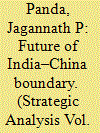

|
|
|
|
|
| Summary/Abstract |
Will India and China resolve their boundary dispute during the tenure of Narendra Modi and Xi Jinping? The strategic communities in both countries are optimistic, particularly after the high tension prevailing along the border during President Xi Jinping’s tour of India in September 2014. Both Prime Minister Modi and President Xi are seen as decisive leaders.1 Both are expected to hold power in their respective countries for a few years to come. Personalities and personas matter greatly for scoring political brownie points. The boundary dispute, quintessentially, is political in nature. The 2005 Agreement on the ‘Political Parameters and Guiding Principles for the Settlement of the India–China Boundary Question’ acknowledged as much: the ‘two sides are seeking a political settlement of the boundary question’.2 In future India–China boundary negotiations, will the two leaders go for territorial exchange or will they remain content with the status quo, and simply define the Line of Actual Control (LAC)?
|
|
|
|
|
|
|
|
|
|
|
|
|
|
|
|
| 17 |
ID:
174262
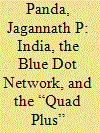

|
|
|
|
|
| Summary/Abstract |
This article argues that India’s prospective inclusion in the Blue Dot Network is a geostrategic necessity that can pave the way for alternative global supply chain networks and quality infrastructure promotion in Asia and beyond as well as allow New Delhi to enhance its long-desired objective of forming a "continental connect" through a "Quad Plus" network.
|
|
|
|
|
|
|
|
|
|
|
|
|
|
|
|
| 18 |
ID:
150227
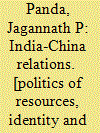

|
|
|
|
|
| Publication |
Oxon, Routledge, 2017.
|
| Description |
xx, 273p.: figures, maps, tablespbk
|
| Series |
Routledge Advances in South Asian Studies
|
| Standard Number |
9781138064522
|
|
|
|
|
|
|
|
|
|
|
|
Copies: C:2/I:0,R:0,Q:0
Circulation
| Accession# | Call# | Current Location | Status | Policy | Location |
| 058931 | 327.54051/PAN 058931 | Main | On Shelf | General | |
| 058932 | 327.54051/PAN 058932 | Main | On Shelf | General | |
|
|
|
|
| 19 |
ID:
155171
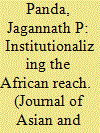

|
|
|
|
|
| Summary/Abstract |
China and India have for quite some time been participants in African politics and have employed persuasive strategies to make their presence felt in that continent. The main objective of their current participation and presence in Africa is to exploit energy resources and establish greater political connections there. The Chinese strategy is to be generous with loans and financial aid; the Indian strategy has been to employ populist and democratic measures, highlighting its historical and cultural connections with Africa. Pursuing stronger bilateral relations with African countries has been the principal medium of their continental reach. But bilateral bonding has been taking a backseat recently in their approach vis-à-vis multilateral relations, for which institutional and organisational bonding is being used as the prime medium. South Africa is a conspicuous illustration of this approach. Both China and India share strong bilateral ties with South Africa, which is the frontier state for their outreach to Africa. Their engagements with that country through multilateral forums like the AU, BRICS, BASIC and IBSA exhibit how multilateralism is becoming for them a leading approach relative to bilateralism. Their objective, besides enriching and influencing their bilateral understanding with that country, is to achieve their global ambitions and objectives in tandem with the African continent on a whole. This paper examines the instrumental approach that the two countries employ towards Africa where multilateralism is becoming a prime channel of contact over bilateralism. To what extent this approach has advanced their strategic interests in Africa commercially and politically also needs analysis.
|
|
|
|
|
|
|
|
|
|
|
|
|
|
|
|
| 20 |
ID:
089910
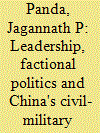

|
|
|
|
|
| Publication |
2009.
|
| Summary/Abstract |
This article highlights the changing dynamics of relations between the Chinese Communist Party (CCP) and the People's Liberation Army under the current leadership. While the military in China still remains politically loyal to the Communist Party, specification of the role of the military in the Chinese Constitution, generational changes in the CCP, factional politics, and relative depoliticization of the military are some of the factors suggesting a 'bifurcation' between the party and the military. In short, the identity of the Chinese military has gone beyond the normal Party-controlled one; and this is essentially because of the increasing importance of the state vis-a-vis its elements and leadership.
|
|
|
|
|
|
|
|
|
|
|
|
|
|
|
|
|
|
|
|
|